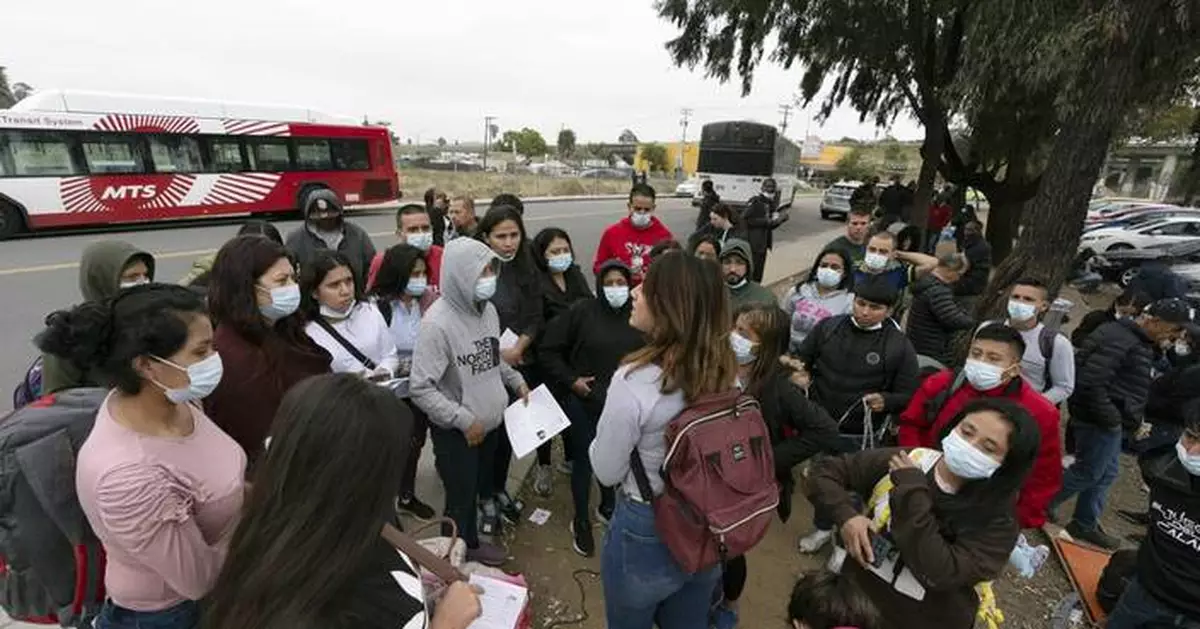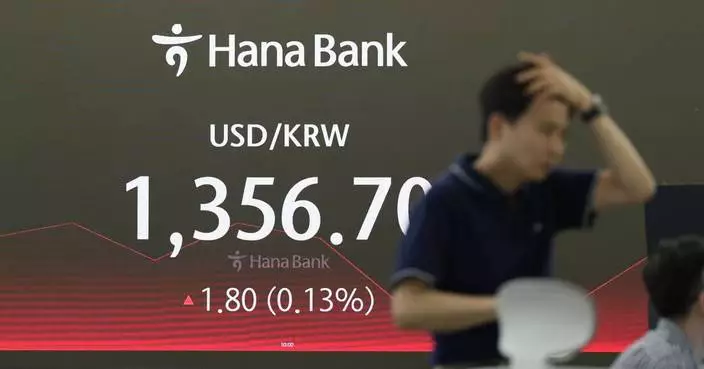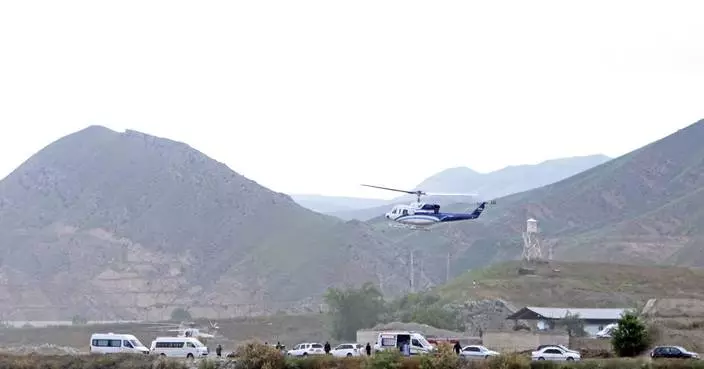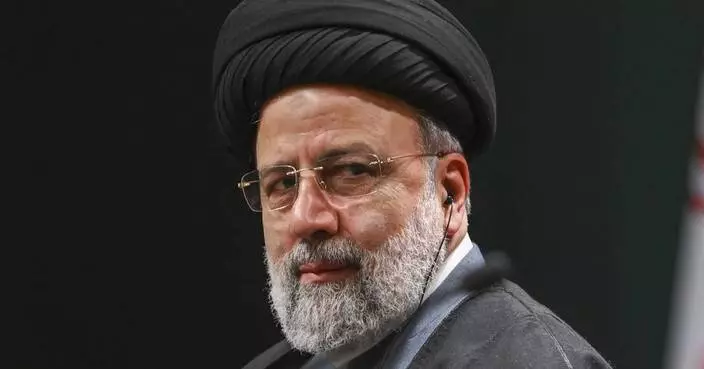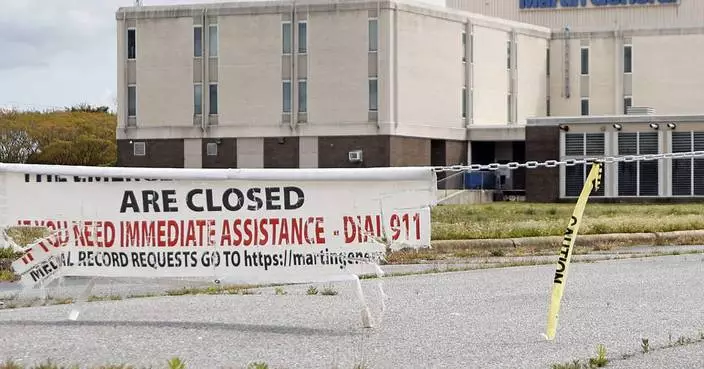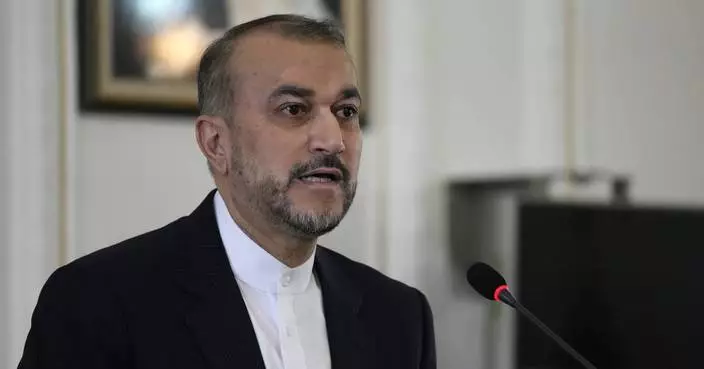WASHINGTON (AP) — A new Biden administration rule announced Thursday aims to speed up asylum processing at the southern border for a limited group of people believed to have committed serious crimes or who have terrorist links and ultimately more quickly eject them from the country.
The change comes as the administration has been struggling to demonstrate to voters during an election where immigration is a key issue that it has a handle on the southern border. Republicans have consistently slammed the Biden administration over policies that they say have worsened problems at the southern border.
In a statement announcing the changes, the Department of Homeland Security said migrants who are deemed to pose a public threat are taken into custody but a determination on whether they're eligible for asylum isn't made until later in the asylum process. Under the proposed rule, asylum officers hearing cases at an initial screening stage called credible fear screening — that's intended to happen just days after a person arrives in the country will now be able to consider that criminal history or terrorist links when deciding whether someone should ultimately be removed from the country.
“This will allow DHS to expeditiously remove individuals who pose a threat to the United States much sooner than is currently the case, better safeguarding the security of our border and our country,” the department said in the statement.
Under current law, certain mandatory bars make people ineligible for asylum, for example, if you've been convicted of a particularly serious crime. But those usually come into play when an immigration judge is making a final determination on whether someone gets asylum and that process can take years. Migrants are usually detained during this time, the department said.
When the rule is in place asylum officers can consider evidence of terrorism links for example and use that as a basis for a denial.
The agency gave no figures on how many people would be affected but said it was small.
Republicans immediately criticized the changes as too little. In a statement, House Committee on Homeland Security Chairman Mark E. Green, a Republican from Tennessee called it an “unserious, politically motivated attempt to address a significant problem the Biden administration itself created.”
Separately from the rule announced Thursday, the administration is weighing larger executive action to crack down on immigration at the border. But the timing on when that might be announced depends in large part on whether the number of illegal border crossings increases. After hitting a record high in December, they have decreased in recent months in large part due to Mexican government enforcement.
Under U.S. and international law, anyone who comes to the U.S. can ask for asylum. People from all over the world travel to the U.S-Mexico border to seek that protection. To be granted asylum they must prove persecution or fear of persecution on account of race, religion, nationality, membership in a particular social group, or political opinion.
It's a high bar and the majority of people who apply for asylum ultimately don't qualify. But the process can take years in overloaded immigration courts.
Critics have questioned whether the asylum system should be fundamentally changed to make it more restrictive while others say the U.S. has a moral obligation to protect people fleeing for their lives.
Last year the administration announced another rule aimed at restricting the asylum process but in much more expansive ways than the one announced Thursday. That rule made it extremely difficult for migrants who come directly to the southern border to get asylum unless they use a government app to make an appointment or they have already tried to seek protection in a country they passed through on their way to the U.S.
Opponents said it’s essentially a rehash of similar efforts by former President Donald Trump and sued. The Biden administration says there are substantial differences between their rule and what Trump tried. That rule is still in place while the issue plays out in court.
Generally, immigration advocates have been hesitant of any steps that would seek to make the initial, credible fear screening harder. They say that migrants are often doing these interviews immediately after surviving life-threatening perilous trips to the U.S. and that these initial credible fear screenings are designed to have a lower bar than final asylum determinations so that people aren't wrongfully removed.
Gregory Chen, the director of government relations for the American Immigration Lawyers Association, said the rules barring people with criminal or terrorist backgrounds from asylum are important to protect the country. But his concern is that these changes will speed up what is already a “highly complex” legal analysis.
“At that early stage, few asylum seekers will have the opportunity to seek legal counsel or time to understand the consequences,” he said. “Under the current process they have more time to seek legal advice, to prepare their case, and to appeal it or seek an exemption.”
The new rule goes into effect after a 30-day comment period.

A migrant adjusts his headwear at a parking lot after being detained and processed for asylum by U.S authorities Tuesday, May 7, 2024, in San Diego. (AP Photo/Ryan Sun)

FILE - Migrants listen to a volunteer in a parking lot after being detained and processed for asylum by U.S. authorities, April 12, 2024, in San Diego. A new Biden administration rule aims to speed up asylum processing at the southern border, enabling it to quickly reject a limited group of people believed to have committed serious crimes or who have terrorist links. The change announced May 9 comes during an election year when immigration is a key issue. (AP Photo/Gregory Bull, File)
JERUSALEM (AP) — The helicopter crash in which Iranian President Ebrahim Raisi, the country’s foreign minister and other officials were killed is likely to reverberate across the Middle East, where Iran’s influence runs wide and deep.
That's because Iran has spent decades supporting armed groups and militants in Lebanon, Syria, Iraq, Yemen and the Palestinian territories, allowing it to project power and potentially deter attacks from the United States or Israel, the sworn enemies of its 1979 Islamic Revolution.
Tensions have never been higher than they were last month, when Iran under Raisi and Supreme Leader Ayatollah Ali Khamenei launched hundreds of drones and ballistic missiles at Israel in response to an airstrike on an Iranian Consulate in Syria that killed two Iranian generals and five officers.
Israel, with the help of the United States, Britain, Jordan and others, intercepted nearly all the projectiles. In response, Israel apparently launched its own strike against an air defense radar system in the Iranian city of Isfahan, causing no casualties but sending an unmistakable message.
The sides have waged a shadow war of covert operations and cyberattacks for years, but the exchange of fire in April was their first direct military confrontation.
The ongoing war between Israel and Hamas has drawn in other Iranian allies, with each attack and counterattack threatening to set off a wider war.
It's a combustible mix that could be ignited by unexpected events, such as Sunday's deadly crash.
Israel has long viewed Iran as its greatest threat because of Tehran's controversial nuclear program, its ballistic missiles and its support for armed groups sworn to Israel's destruction.
Iran views itself as the chief patron of Palestinian resistance to Israeli rule, and top officials for years have called for Israel to be wiped off the map.
Raisi, who was a hard-liner viewed as a protégé and possible successor of Khamenei, chastised Israel last month, saying “the Zionist Israeli regime has been committing oppression against the people of Palestine for 75 years.”
“First of all we have to expel the usurpers, secondly we should make them pay the cost for all the damages they have created, and thirdly, we have to bring to justice the oppressor and usurper," he said.
Israel is believed to have carried out numerous attacks over the years targeting senior Iranian military officials and nuclear scientists.
There is no evidence Israel was involved in Sunday's helicopter crash, and Israeli officials have not commented on the incident.
Arab countries on the Persian Gulf have also long viewed Iran with suspicion, a key factor in the decision of the United Arab Emirates and Bahrain to normalize relations with Israel in 2020, and of Saudi Arabia to consider such a move.
Iran has provided financial and other support over the years to the Palestinian militant group Hamas, which led the Oct. 7 attack into Israel that triggered the Gaza war, and the smaller but more radical Palestinian Islamic Jihad, which took part in it. But there is no evidence that Iran was directly involved in the attack.
Since the start of the war, Iran's leaders have expressed solidarity with the Palestinians. Their allies in the region have gone much further.
Lebanon's Hezbollah militant group, Iran's most militarily advanced proxy, has waged a low-intensity conflict with Israel since the start of the Gaza war. The two sides have traded strikes on a near-daily basis along the Israel-Lebanon border, forcing tens of thousands of people on both sides to flee.
So far, however, the conflict has not boiled over into a full-blown war that would be disastrous for both countries.
Iran-backed militias in Syria and Iraq launched repeated attacks on U.S. bases in the opening months of the war but pulled back after U.S. retaliatory strikes for a drone attack that killed three American soldiers in January.
Yemen's Houthi rebels, another ally of Iran, have repeatedly targeted international shipping in what they portray as a blockade of Israel. Those strikes, which often target ships with no apparent links to Israel, have also drawn U.S.-led retaliation.
Iran's influence extends beyond the Middle East and its rivalry with Israel.
Israel and Western countries have long suspected Iran of pursuing nuclear weapons in the guise of a peaceful atomic program in what they see as a threat to non-proliferation everywhere.
Then-President Donald Trump's withdrawal from a landmark nuclear pact between Iran and world powers in 2018, and his imposition of crushing sanctions, led Iran to gradually abandon all the limits placed on its program by the deal.
These days, Iran is enriching uranium to up to 60% purity — near weapons-grade levels of 90%. Surveillance cameras installed by the U.N. nuclear agency have been disrupted, and Iran has barred some of the agency's most experienced inspectors. Iran has always insisted its nuclear program is for purely peaceful purposes, but the United States and others believe it had an active nuclear weapons program until 2003.
Israel is widely believed to be the only nuclear-armed power in the Middle East but has never acknowledged having such weapons.
Iran has also emerged as a key ally of Russia following its invasion of Ukraine, and is widely accused of supplying exploding drones that have wreaked havoc on Ukraine's cities. Raisi himself denied the allegations last fall in an interview with The Associated Press, saying Iran had not supplied such weapons since the outbreak of hostilities in February 2022.
Iranian officials have made contradictory comments about the drones, while U.S. and European officials say the sheer number being used in the war in Ukraine shows that the flow of such weapons has intensified since the war began.

In this photo provided by Moj News Agency, rescue teams' vehicles are seen near the site of the incident of the helicopter carrying Iranian President Ebrahim Raisi in Varzaghan in northwestern Iran, Sunday, May 19, 2024. A helicopter carrying President Raisi, the country's foreign minister and other officials apparently crashed in the mountainous northwest reaches of Iran on Sunday, sparking a massive rescue operation in a fog-shrouded forest as the public was urged to pray. (Azin Haghighi/Moj News Agency via AP)

An Iranian woman prays for President Ebrahim Raisi in a ceremony at Vali-e-Asr square in downtown Tehran, Iran, Sunday, May 19, 2024. A helicopter carrying President Raisi, the country's foreign minister and other officials apparently crashed in the mountainous northwest reaches of Iran on Sunday, sparking a massive rescue operation in a fog-shrouded forest as the public was urged to pray. (AP Photo/Vahid Salemi)

People pray for President Ebrahim Raisi in a ceremony at Vali-e-Asr square in downtown Tehran, Iran, Sunday, May 19, 2024. A helicopter carrying President Raisi, the country's foreign minister and other officials apparently crashed in the mountainous northwest reaches of Iran on Sunday, sparking a massive rescue operation in a fog-shrouded forest as the public was urged to pray. (AP Photo/Vahid Salemi)

FILE - People gather around a component from an intercepted ballistic missile that fell near the Dead Sea in Israel, Saturday, April 20, 2024. The apparent crash of a helicopter carrying Iranian President Ebrahim Raisi, the country's foreign minister and other top officials is likely to reverberate across the Middle East. Tensions have soared since the start of the Israel-Hamas war, and Israel and Iran directly traded fire for the first time ever in April. (AP Photo/Itamar Grinberg, File)

FILE - Iranian worshippers chant slogans during an anti-Israeli gathering after Friday prayers in Tehran, Iran, Friday, April 19, 2024. The apparent crash of a helicopter carrying Iranian President Ebrahim Raisi, the country's foreign minister and other top officials is likely to reverberate across the Middle East. Tensions have soared since the start of the Israel-Hamas war, and Israel and Iran directly traded fire for the first time ever in April. (AP Photo/Vahid Salemi, File)




